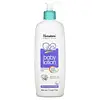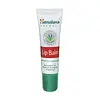Himalaya Baby Lotion Versus Himalaya Lip Balm
What's inside
What's inside
 Key Ingredients
Key Ingredients

 Benefits
Benefits

 Concerns
Concerns

 Ingredients Side-by-side
Ingredients Side-by-side

Water
Skin ConditioningCetyl Alcohol
EmollientOlea Europaea Fruit Oil
MaskingPrunus Amygdalus Dulcis Oil
Skin ConditioningGlyceryl Stearate Se
EmulsifyingEthylhexyl Stearate
EmollientSorbitan Stearate
EmulsifyingGlycerin
HumectantSodium Cetearyl Sulfate
CleansingPhenoxyethanol
PreservativeDimethicone
EmollientParfum
MaskingIsopropyl Myristate
EmollientAcrylates/C10-30 Alkyl Acrylate Crosspolymer
Emulsion StabilisingSida Cordifolia Root Extract
Skin ConditioningGlycyrrhiza Glabra Root Extract
BleachingTinospora Cordifolia Stem Extract
Skin ConditioningUndecylenoyl Glycine
CleansingCapryloyl Glycine
CleansingXanthan Gum
EmulsifyingDisodium EDTA
Tocopheryl Acetate
AntioxidantSodium Hydroxide
BufferingWater, Cetyl Alcohol, Olea Europaea Fruit Oil, Prunus Amygdalus Dulcis Oil, Glyceryl Stearate Se, Ethylhexyl Stearate, Sorbitan Stearate, Glycerin, Sodium Cetearyl Sulfate, Phenoxyethanol, Dimethicone, Parfum, Isopropyl Myristate, Acrylates/C10-30 Alkyl Acrylate Crosspolymer, Sida Cordifolia Root Extract, Glycyrrhiza Glabra Root Extract, Tinospora Cordifolia Stem Extract, Undecylenoyl Glycine, Capryloyl Glycine, Xanthan Gum, Disodium EDTA, Tocopheryl Acetate, Sodium Hydroxide
Ingredients Explained
These ingredients are found in both products.
Ingredients higher up in an ingredient list are typically present in a larger amount.
Dimethicone is a type of synthetic silicone created from natural materials such as quartz.
What it does:
Dimethicone comes in different viscosities:
Depending on the viscosity, dimethicone has different properties.
Ingredients lists don't always show which type is used, so we recommend reaching out to the brand if you have questions about the viscosity.
This ingredient is unlikely to cause irritation because it does not get absorbed into skin. However, people with silicone allergies should be careful about using this ingredient.
Note: Dimethicone may contribute to pilling. This is because it is not oil or water soluble, so pilling may occur when layered with products. When mixed with heavy oils in a formula, the outcome is also quite greasy.
Learn more about DimethiconeIsopropyl Myristate is an emollient, thickening agent, and texture enhancer. It is created from isopropyl alcohol and myristic acid.
It is used to help other ingredients be better absorbed. It is also an emollient and may help soften and hydrate the skin.
The comedogenic rating of this ingredient depends on the concentration. Lower amounts results in a lower rating.
Isopropyl Myristate may not be fungal acne safe. It can potentially worsen acne prone skin.
Learn more about Isopropyl MyristateParfum is a catch-all term for an ingredient or more that is used to give a scent to products.
Also called "fragrance", this ingredient can be a blend of hundreds of chemicals or plant oils. This means every product with "fragrance" or "parfum" in the ingredients list is a different mixture.
For instance, Habanolide is a proprietary trade name for a specific aroma chemical. When used as a fragrance ingredient in cosmetics, most aroma chemicals fall under the broad labeling category of “FRAGRANCE” or “PARFUM” according to EU and US regulations.
The term 'parfum' or 'fragrance' is not regulated in many countries. In many cases, it is up to the brand to define this term.
For instance, many brands choose to label themselves as "fragrance-free" because they are not using synthetic fragrances. However, their products may still contain ingredients such as essential oils that are considered a fragrance by INCI standards.
One example is Calendula flower extract. Calendula is an essential oil that still imparts a scent or 'fragrance'.
Depending on the blend, the ingredients in the mixture can cause allergies and sensitivities on the skin. Some ingredients that are known EU allergens include linalool and citronellol.
Parfum can also be used to mask or cover an unpleasant scent.
The bottom line is: not all fragrances/parfum/ingredients are created equally. If you are worried about fragrances, we recommend taking a closer look at an ingredient. And of course, we always recommend speaking with a professional.
Learn more about Parfum